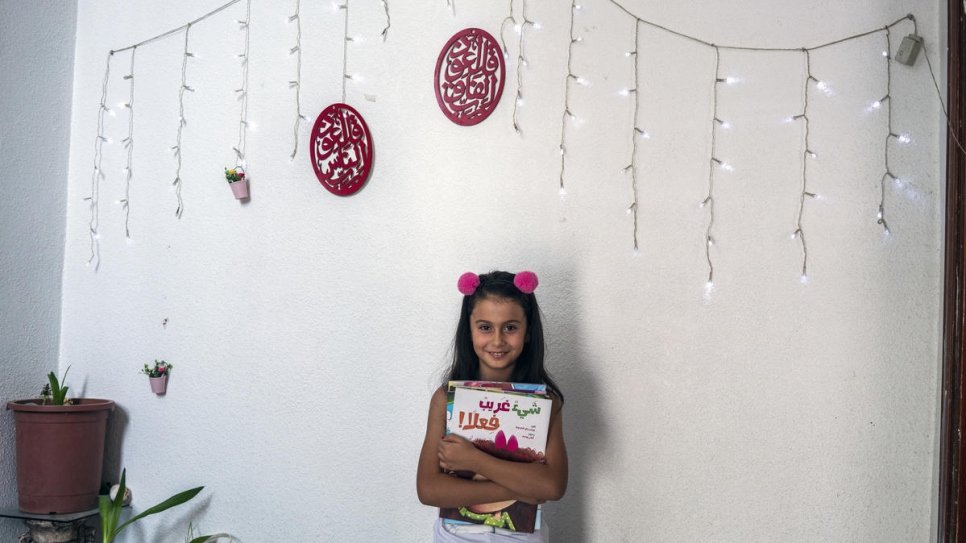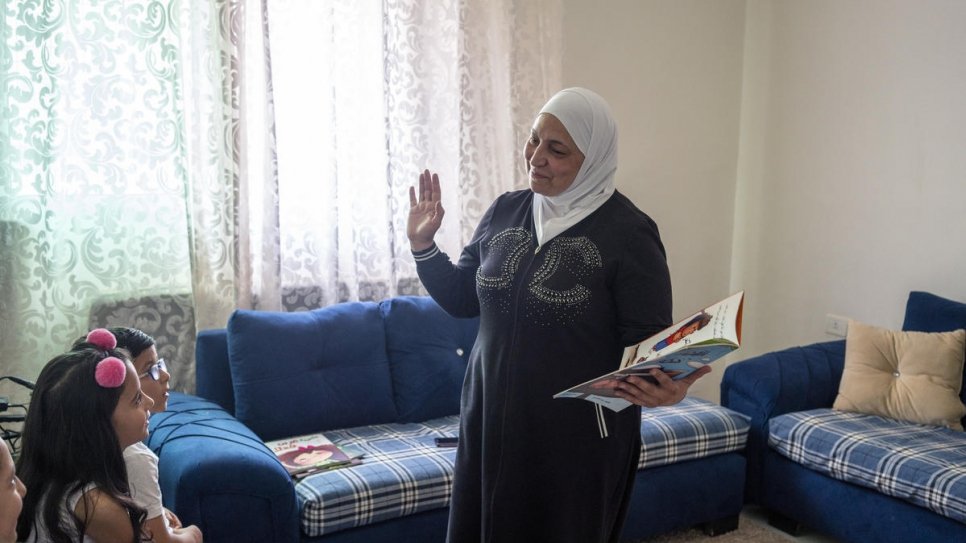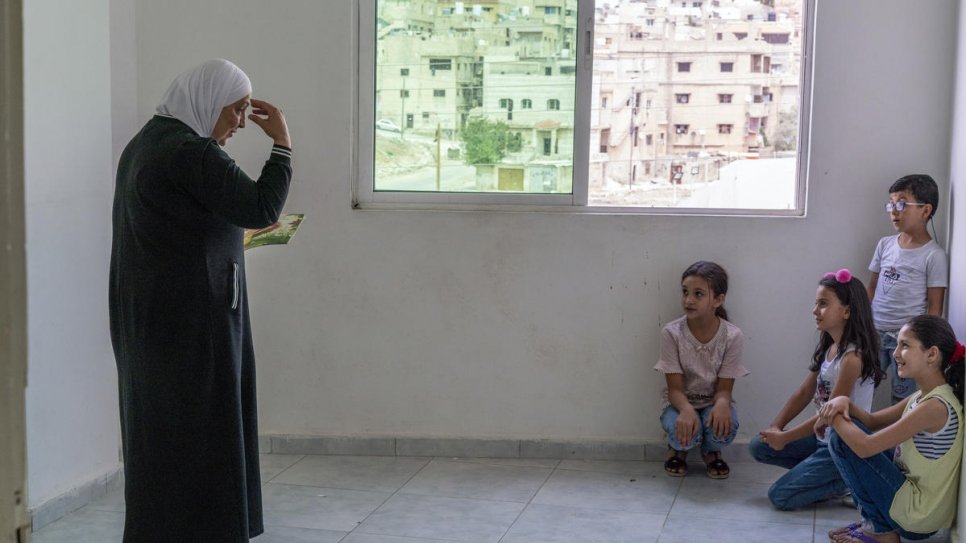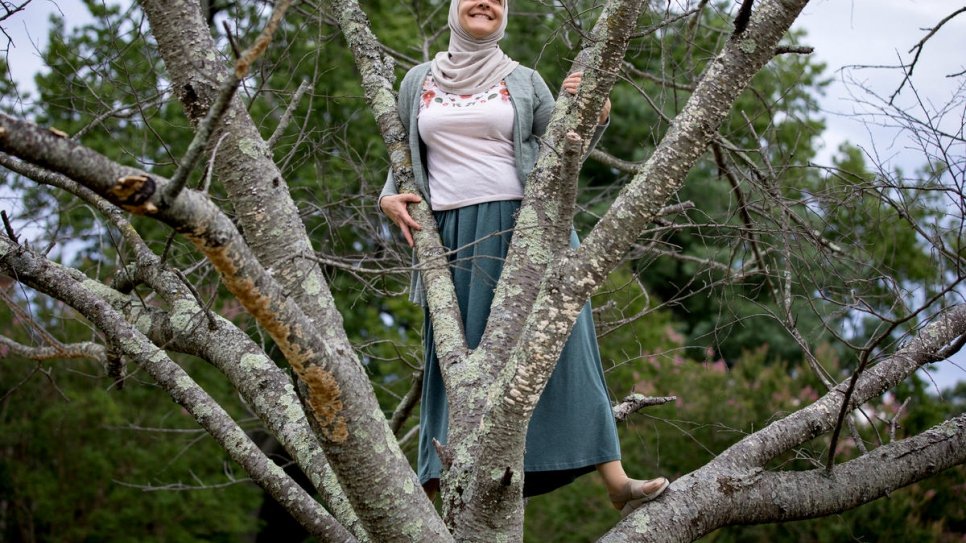Jordanian scientist finds winning formula to get kids reading
Rana Dajani is regional winner for MENA of the UNHCR Nansen Refugee Award for her programme to get children reading for pleasure, that has since gone global.
Rana Dajani, the Jordanian founder and director of We Love Reading, is photographed in the children's section of a public library in Richmond, Virginia, USA.
© UNHCR/Evelyn Hockstein
Dr. Rana Dajani had recently returned to her home country of Jordan in 2006 after five years abroad, when she was struck by an observation that sparked her irrepressible curiosity: why did so few Jordanian children read for pleasure?
While most would have briefly pondered the question before carrying on with their lives, Dajani’s inquiring mind was unable to let it go. As an accomplished molecular biologist who has studied and worked at some of the world’s leading academic institutions, including Harvard and Yale, she began to research the issue more closely.
“I started asking questions, making observations, digging through the literature,” said Dajani, who is currently in the United States of America where she was teaching when Jordan’s airports closed in March due to COVID-19, leaving her unable to return home.
Speaking quickly, as if her words sometimes struggled to keep up with her train of thought, Dajani added: “I realized that the way for a child to fall in love with reading is by having a role model, a parent who's reading aloud to the child.”
"I couldn't sleep. I had to do something."
Armed with this insight, she said it was the values of her Muslim upbringing that forced her to act on what she had learnt – not just for the benefit of her own children, but as many children as she could reach.
“I felt this huge responsibility, that I had to do something for the children around me. And I felt if I didn't, then this would be on me because I had the solution. I couldn't sleep. I had to do something.”
That was how the We Love Reading project was born, which today is active in 56 countries worldwide, has trained over 7,000 – mostly women – volunteer readers, and has brought the joy of reading to nearly half a million children, including tens of thousands of young refugees in Jordan and beyond.
For her work in promoting reading and education among refugees, host communities and others, Dajani has been chosen as the regional winner for the Middle East and North Africa for UNHCR’s Nansen Refugee Award, a prestigious annual prize that honours those who have gone to extraordinary lengths to help forcibly displaced and stateless people.
The as-yet-undisclosed global laureate of the award will be announced on 1 October. The prize itself will be presented by UNHCR, the UN Refugee Agency, in a virtual ceremony on 5 October.
Back in 2006, We Love Reading began with a single weekly session at which Dajani read aloud to the neighbourhood children at her local mosque. But all the while, she was thinking of ways to expand the initiative to every neighbourhood in the country.
“After three years of tinkering … I had reduced the programme to the most simple formula where it was still effective and still impactful,” Dajani said. “We Love Reading became a training programme, where we would train adults and youth from age 16 to 100 years old.”
“We train them how to read aloud as an art, because most of them have never been read aloud to, so they don't know how to do it to make it fun,” she continued. “And we train them also on how to start a reading aloud session in their neighborhood.”
Those that receive the training are known as reading ambassadors, who are then encouraged to establish reading sessions in their own neighbourhoods on a purely voluntary basis and promote the scheme by word of mouth.
In this way, Dajani says, the programme has become a grassroots movement in which participants feel a sense of ownership and empowerment, with more than 4,400 sessions currently being held worldwide.
"They run it. They own it."
“They are responsible for it. They run it. They own it,” Dajani explained. “That's the ‘secret sauce’ of We Love Reading: how people take up the programme and run with it wherever they are.”
The scheme has proved particularly effective in refugee settings in Jordan, which currently hosts more than 658,000 registered Syrian refugees, having a positive impact on both refugee children and adult volunteers. Following this success, the model has been replicated at Kule refugee camp in Ethiopia.
“Most refugees don’t know what’s going to happen in the future … and this impacts their mental health,” Dajani said. “We Love Reading gives them a purpose, something that is tangible and … a sense of agency. The sense of control is so important for building resilience and improving the positive mentality.”
That was the case for Latifa Al-Laham, a 55-year-old Syrian refugee from Damascus who fled the conflict to Jordan in 2013. Having left school after sixth grade, she had avoided books and reading most of her adult life. But after completing the training in January, not only has she begun regularly reading to her own grandchildren and her neighbours’ kids, she has also become an avid reader herself.
"We need to believe in ourselves, because nothing is impossible."
“Reading has made the kids love me more, and I also set aside special time to read for myself before sunset once I’ve finished cooking,” Latifa said. “I’m a different person after the training. It gave me the power and confidence to become someone different. Even at my age, you can change your life.”
While Dajani admits that she is surprised by the global popularity of We Love Reading, she said its success is driving her to work even harder to bring the benefits of a love of reading to more children.
“I never really believed it would reach where it is today, but I dreamt it. And this is a testament that we need to dream and … we need to believe in ourselves, because nothing is impossible,” she said.
The Nansen Refugee Award is named in honour of Norwegian explorer and humanitarian Fridtjof Nansen, the first High Commissioner for Refugees and Nobel Prize winner, who was appointed by the League of Nations in 1921. It aims to showcase his values of perseverance and commitment in the face of adversity.
You can read about the other regional winners of the UNHCR Nansen Refugee Award here.
Additional reporting by Charlie Dunmore and Lilly Carlisle in Amman, Jordan.




